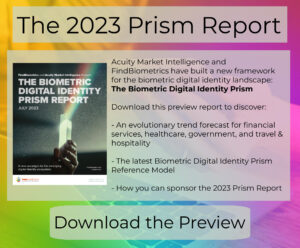Welcome to FindBiometrics’ digest of identity industry news. Here’s what you need to know about the world of digital identity and biometrics today:
Eighth Army, Korean Allies Explore PoW Biometrics
The Eighth Army, which commands all United States Army forces in South Korea, is exploring the use of biometric technology to keep track of Prisoners of War, in collaboration with their Korean counterparts. According to US Army report, at a recent meeting of Eighth Army and Republic of Korea military officers, there was a demonstration of “a detainee reporting system and biometric system capable of real-time viewing and utilization of prisoner data”. The officials pledged to schedule additional meetings to further explore the system’s use.
Texas Rep. Introduces Bill Mandating DNA Scanning at Border
Republican Rep. Lance Gooden of Texas has introduced legislation that would compel the Department of Homeland Security or Health and Human Services to collect the DNA of migrants at the Mexican border, and to use it to substantiate claims of familial relationships. A pilot version of such an effort had been taken under the Trump administration in 2020 and was decried by some Democrats as an invasive collection of sensitive biometric data. Rep. Gooden believes it’s an important measure to combat violent drug cartels that “are using children as pawns in their illicit border operations”, he said.
CAT-2 Arrives in Cedar Rapids
Cedar Rapids’ Eastern Iowa Airport has become one of the latest to see the deployment of the Transportation Security Administration’s new CAT-2 scanners, enabling biometric passenger processing. The scanners feature facial recognition technology designed to match a traveler to their photo ID, and also support the ability to read mobile credentials such as Apple’s mobile driver’s license, though the latter is only supported in a small handful of states. The TSA has now deployed CAT-2 across 25 airports, and plans to bring the kiosks to hundreds more in the years ahead.
Manila Authorities Seek Facial Recognition for Transportation ‘Nerve Center’
The Metropolitan Manila Development Authority in the Philippines’ capital has inaugurated a new communications and command center that Acting Chairperson Don Artes describes as the “nerve center of Metro Manila’s major thoroughfares.” The command center will monitor over 400 camera feeds, and MMDA authorities plan to procure and deploy facial recognition and behavioral analytics technologies in the future, which will be used by the Department of the Interior and Local Government to fight crime.
Benji Hutchinson is ROC.ai’s New Chief Revenue Officer
Rank One Computing (“ROC.ai”) has named Benji Hutchinson as its new Chief Revenue Officer. Hutchinson is a seasoned biometrics industry executive, having previously served in senior roles with IDEMIA, NEC Corporation of America, and Paravision. He was also a Special Government Employee and member of the US Department of Commerce’s Law Enforcement Subcommittee of the National Artificial Intelligence Advisory Committee (NAIAC). “At ROC, we continue to build the world’s most trusted team of biometric and computer vision technology experts, centered around integrity and camaraderie,” explained CEO Scott Swann.
Veriff Certified Under DIATF, While IDnow Gets ISO 27001 Certification
Veriff has been certified under the UK government’s Digital Identity and Attributes Trust Framework (UKDIATF). In so doing, it joins a select group of other remote identity verification specialists that have essentially been rubber-stamped by the government’s Home Office as reliable providers of digital identity services. Veriff COO Indrek Heinloo emphasized that the certification has global implications. “Even though UKDIATF is specifically designed for the UK market, certification requirements such as data privacy, risk management, and others – are in line with global industry standards,” he said.
IDnow has attained ISO 27001 certification, confirming that the company has implemented robust information security protocols. The news comes shortly after IDnow became the first company to obtain an LSTI ISO/IEC 30107 certificate through a newly established testing program from CLR Labs and LSTI. That testing program is focused on the evaluation of products and services using biometric technologies, and assessed IDnow’s VideoIdent selfie-based identity verification platform. IDnow co-founder and Chief Technology and Security Officer Armin Bauer says the latest ISO certification “marks a significant milestone in our commitment to delivering the most secure identity verification solutions to our customers and partners.”
GitHub Enables Passkey Support in Public Beta
GitHub has enabled support for the use of passkeys in its public beta. The platform, which lets software developers collaborate on projects by storing shared code, made two-factor authentication mandatory for all developers in March of this year. Now, those using its public beta can replace both their password and 2FA method with a passkey, which essentially stores a cryptographic passcode on a user’s mobile device, and locks it behind a PIN or biometric scan.
HooYu Acquisition Pays Off in Mitek Update
Mitek has issued a corporate update for its fourth quarter and full 2022 fiscal year, showing, among other things, that its acquisition of HooYu in March of last year has been paying off. The company is reporting a 20 percent year-over-year revenue increase for fiscal 2022, with sales amounting to $143.9 million. For the fourth quarter, revenues were up 17 percent year-over-year, reaching $38.8 million. Mitek attributed the revenue increase both to additional sales resulting from its acquisition of HooYu and to increased demand for its own “digital identity verification and deposits solutions,” noting that “commerce continues its rapid shift to digital channels.”
Vernon ShopRite Gives Shoppers Data Collection Notice
A grocery store in Vernon, Connecticut has raised some customers’ eyebrows with a new notice informing them that it collects their biometric data. Responding to inquiries from a local NBC outlet, a manager at the ShopRite explained that the store uses facial recognition to identify shoplifters, and explained that the notice was intended to ensure compliance with the Connecticut Data Privacy Act, which took effect July 1, 2023. The state’s Attorney General’s office, which has the discretion to investigate violations of the CT Data Privacy Act, told NBC that the regulation not only requires businesses to disclose their processing of sensitive data, but to obtain clear consent from consumers.
–
July 12, 2023 – by Alex Perala









Follow Us